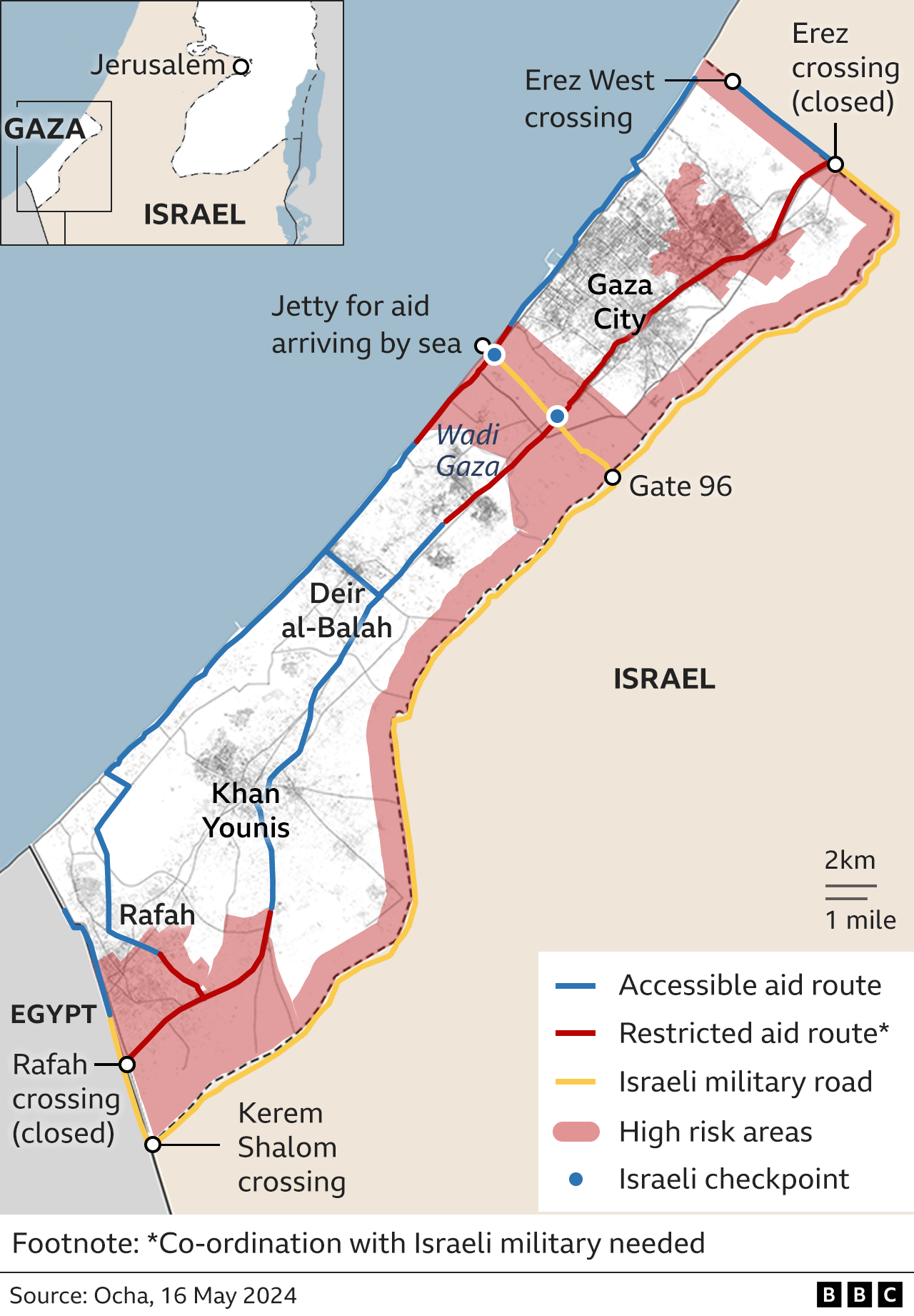Two thousand aid trucks stuck at Rafah border, aid group warns
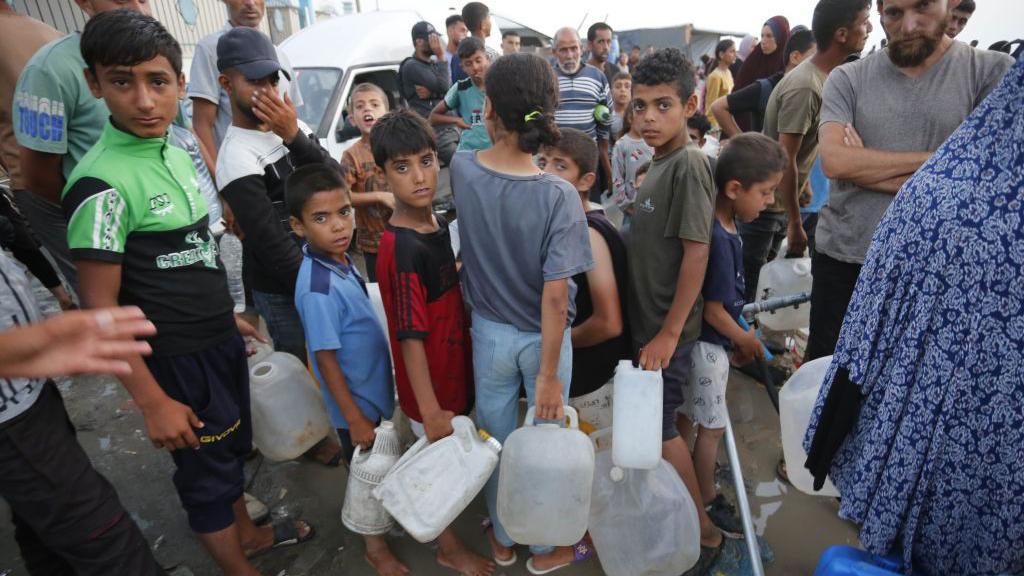
Many of the displaced Palestinians who have fled Rafah are now in Deir al-Balah, where there is a lack of basic services
- Published
Humanitarian assistance in Gaza has been “systematically paralysed” by restrictions imposed by the warring parties there, warns the Norwegian Refugee Council.
The organisation said 2,000 aid trucks were stuck on the Egyptian side of the Rafah border crossing, which has been closed since Israel’s military launched an operation against Hamas in the southern city of Rafah on 6 May.
Suze van Meegen, NRC’s head of operations for Gaza, said Palestinians were being “actively deprived” of much-needed shipments of medicine, tents, water tanks, sanitary products and other basics.
The Israel Defense Forces (IDF) says it has opened new crossings, paved roads and fixed water pipes to ease the suffering of Palestinians, and claims one million displaced people have evacuated from Rafah, ahead of the fighting.
Israeli hostage's family hope kidnap video reminds world of need for deal
- Published23 May 2024
UN halts Rafah food distribution due to shortages and hostilities
- Published22 May 2024
Three-quarters of Gaza marked as IDF evacuation zones, BBC finds
- Published20 May 2024
Ms van Meegen said: “The city of Rafah is now comprised of three entirely different worlds: the east is an archetypal war zone, the middle is a ghost town, and the west is a congested mass of people living in deplorable conditions.”
She also claimed that some Palestinians had been displaced up to nine times since the conflict began in October.
“People have no choice but to put their faith in so-called ‘humanitarian safe zones’ designated by the forces that have killed their family members and destroyed their homes.”
Satellite images show how areas previously covered with tents and makeshift shelters have been cleared since Israel’s military operation in Rafah started. There is also growing evidence of destruction of buildings and infrastructure in the city.
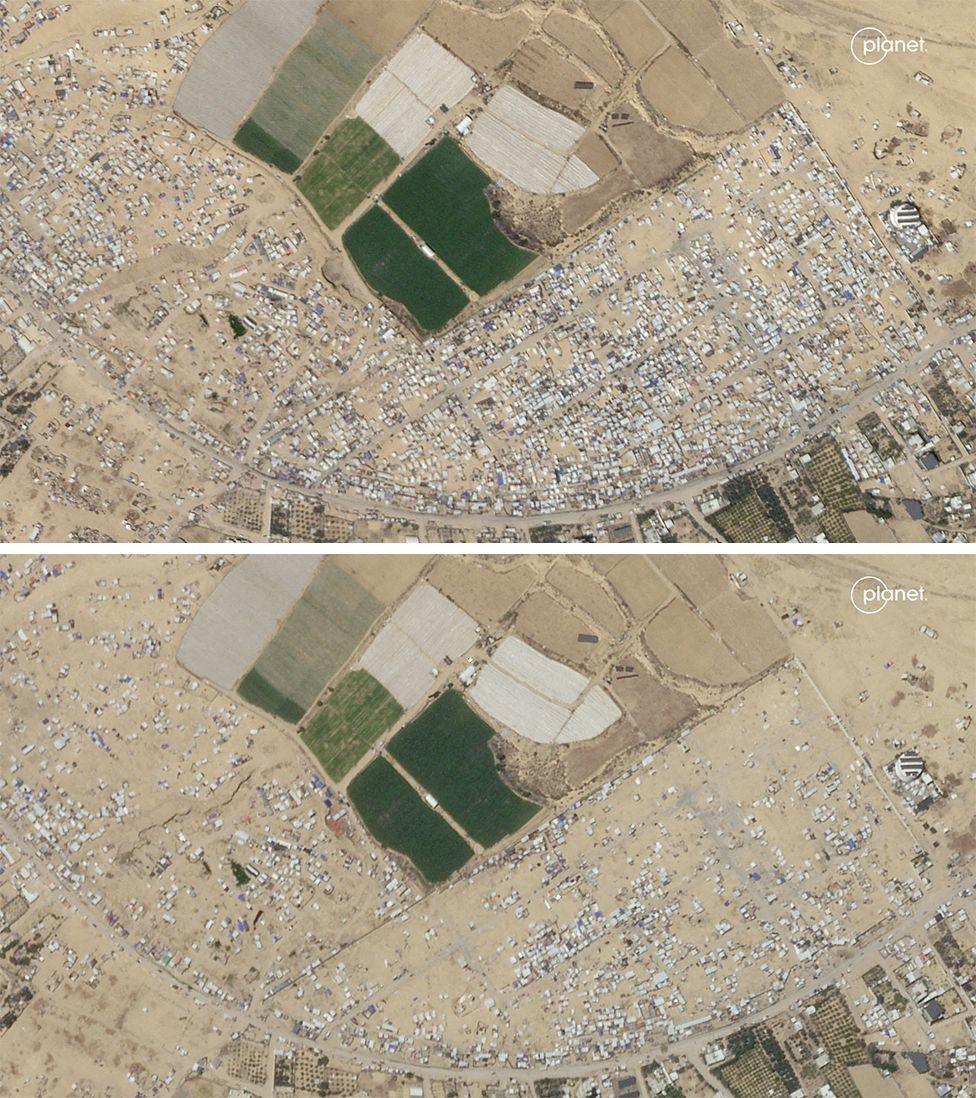
Satellite images show the disappearance of large numbers of tents and shelters in Rafah between 5 May (top) - the day before the Israeli operation began - and 8 May (bottom)
IDF spokesman Rear Admiral Daniel Hagari said forces were operating in a “targeted and precise” way to eradicate remaining Hamas battalions.
“Hamas terrorists are waging war while embedding themselves inside and under civilian areas in Rafah - because Hamas wants Gazan civilians to be caught in the crossfire. We don’t.”
Amos Harel, a defence journalist with the Israeli newspaper Haaretz, said forces were making significant progress in taking control of the city and the Philadelphi Corridor, a narrow strip of land that runs along the border with Egypt.
“By now they’ve covered more than half of the Philadelphi Corridor and they didn’t see any serious Hamas opposition in that area,” he said.
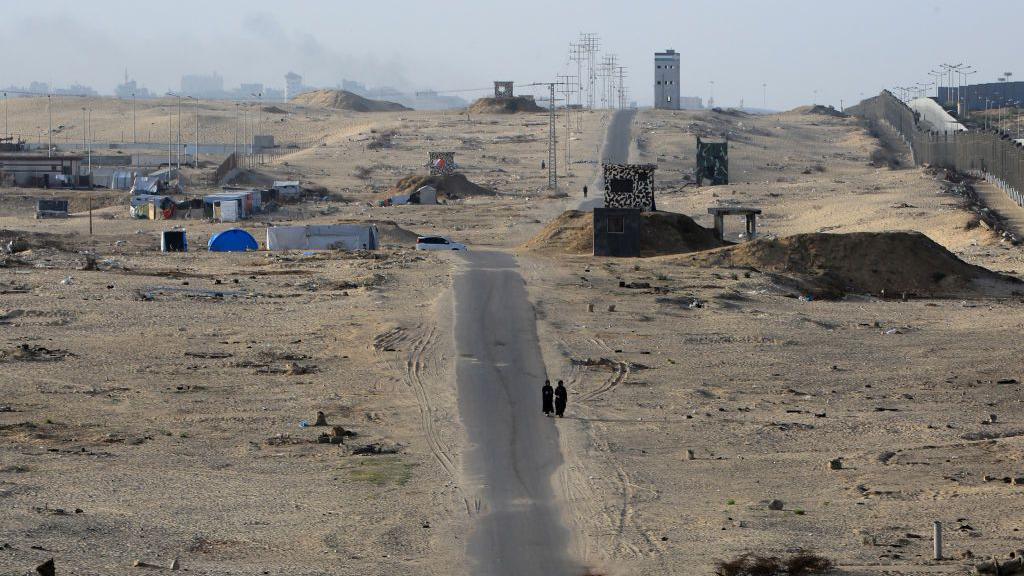
The Philadelphi Corridor is a narrow strip of land that runs along the Gaza-Egypt border (right)
Harel also believes Israel has been given a green light by the US to continue its military advance further into Rafah, despite President Joe Biden having previously warned against going into “population centres”.
“It’s quite clear that the Americans are no longer trying to prevent Israel from occupying Rafah. So the Israelis may proceed carefully and not too quickly. But it’s less of a question of whether the Israelis are going to occupy Rafah. It’s quite clear that they are.”
The International Court of Justice (ICJ) is expected to rule on Friday whether the IDF’s operations in Rafah should be halted.
South Africa submitted the request to the UN’s top court this month, as part of a case it filed in December that accused Israel of genocide against the Palestinians. Israel has accused South Africa of presenting biased and false claims.
An Israeli government spokesman said: "No power on Earth will stop Israel from protecting its citizens and going after Hamas in Gaza.”
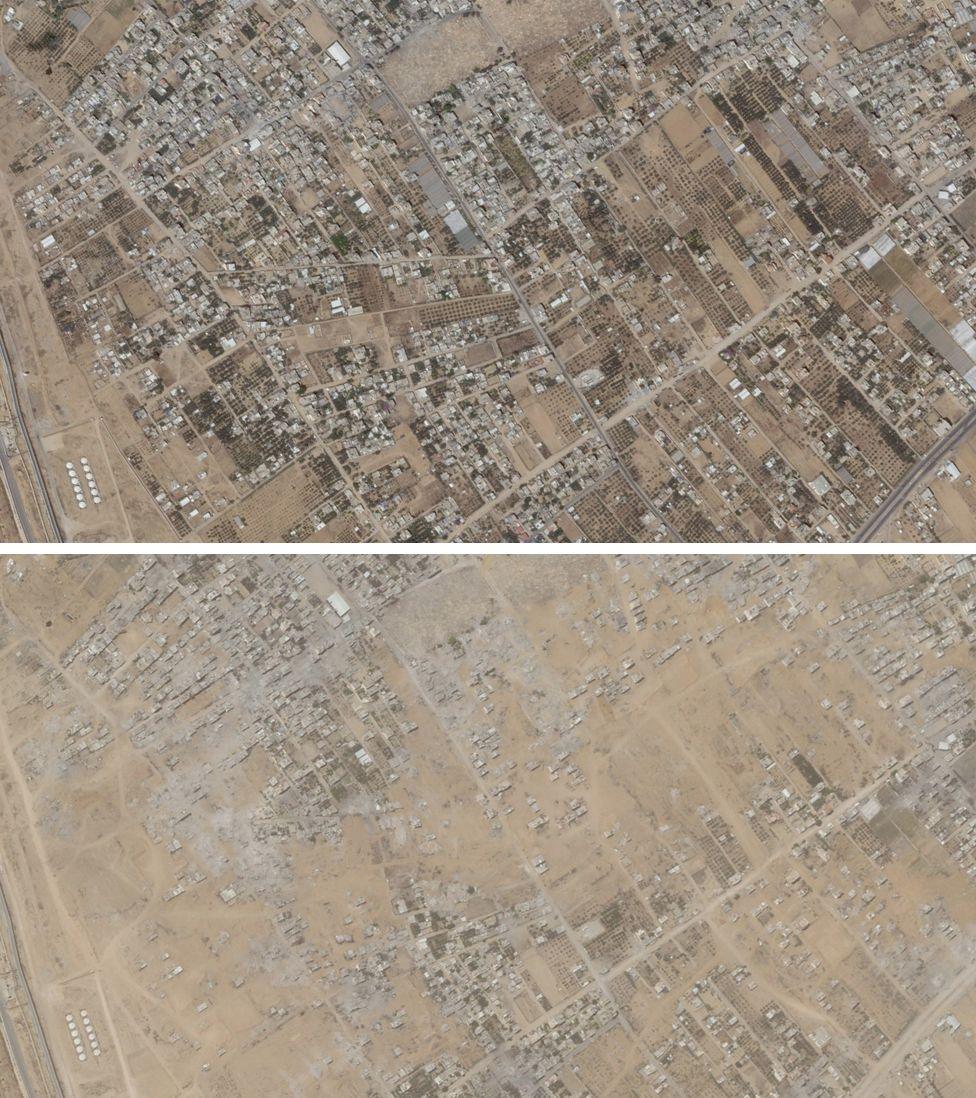
Satellite images from 5 May (top) and 22 May (bottom) show the destruction of buildings just north of the Rafah border crossing and a section of the Philadelphi Corridor (left)
There’s also been intense fighting in the north of Gaza, especially around Jabalia, where 27 patients and staff are refusing to leave the al-Awda hospital despite Israeli soldiers ordering them to evacuate.
Most of the occupants have been moved following four days of military action around the hospital, but the deputy director, Mohammed Salha, told the BBC: “I had a clear discussion with the Israeli officer and I said to him I will not evacuate the hospital. If you can’t provide ambulances, sorry, I will not evacuate.”
The BBC understands that 14 staff members remain, along with 11 patients and two parents of children who are patients.
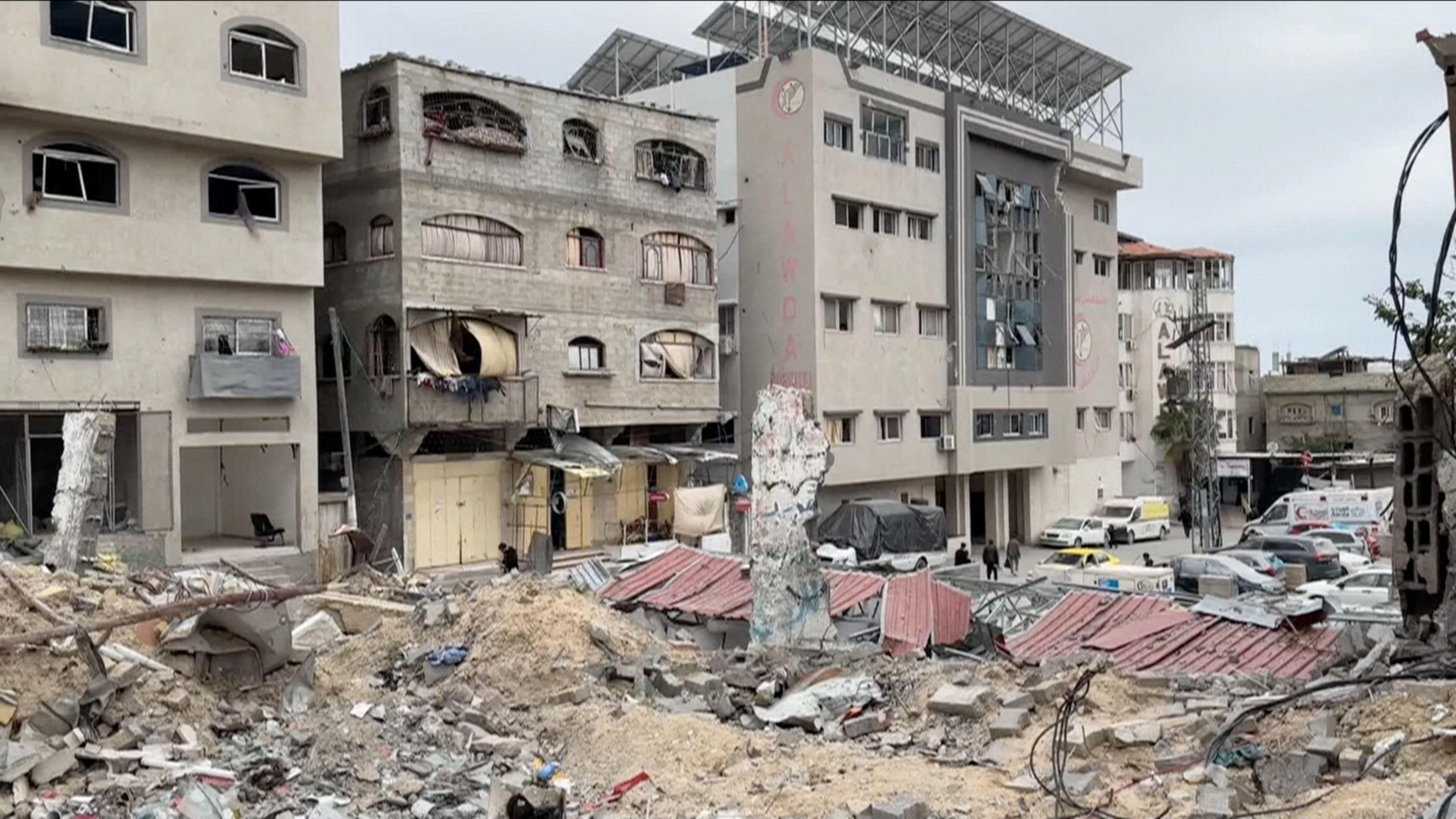
A video released by the WHO on Tuesday showed damage to the exterior of al-Awda hospital in Jabalia, northern Gaza
Mr Salha added: “If we evacuate, these patients will be lost, they will not get the health services they need.”
He said there was only rainwater to drink and they were considering cutting meals to one per day to save food.
He also said the hospital’s source of power was running short.
“We are using a small generator a couple of hours a day to charge the batteries in the hospital.”
“We do not have any more clean water. The Israeli forces destroyed our filter system two months ago. We are completely dependent on companies and organisations delivering fresh water, but because of the siege they are not getting through.”
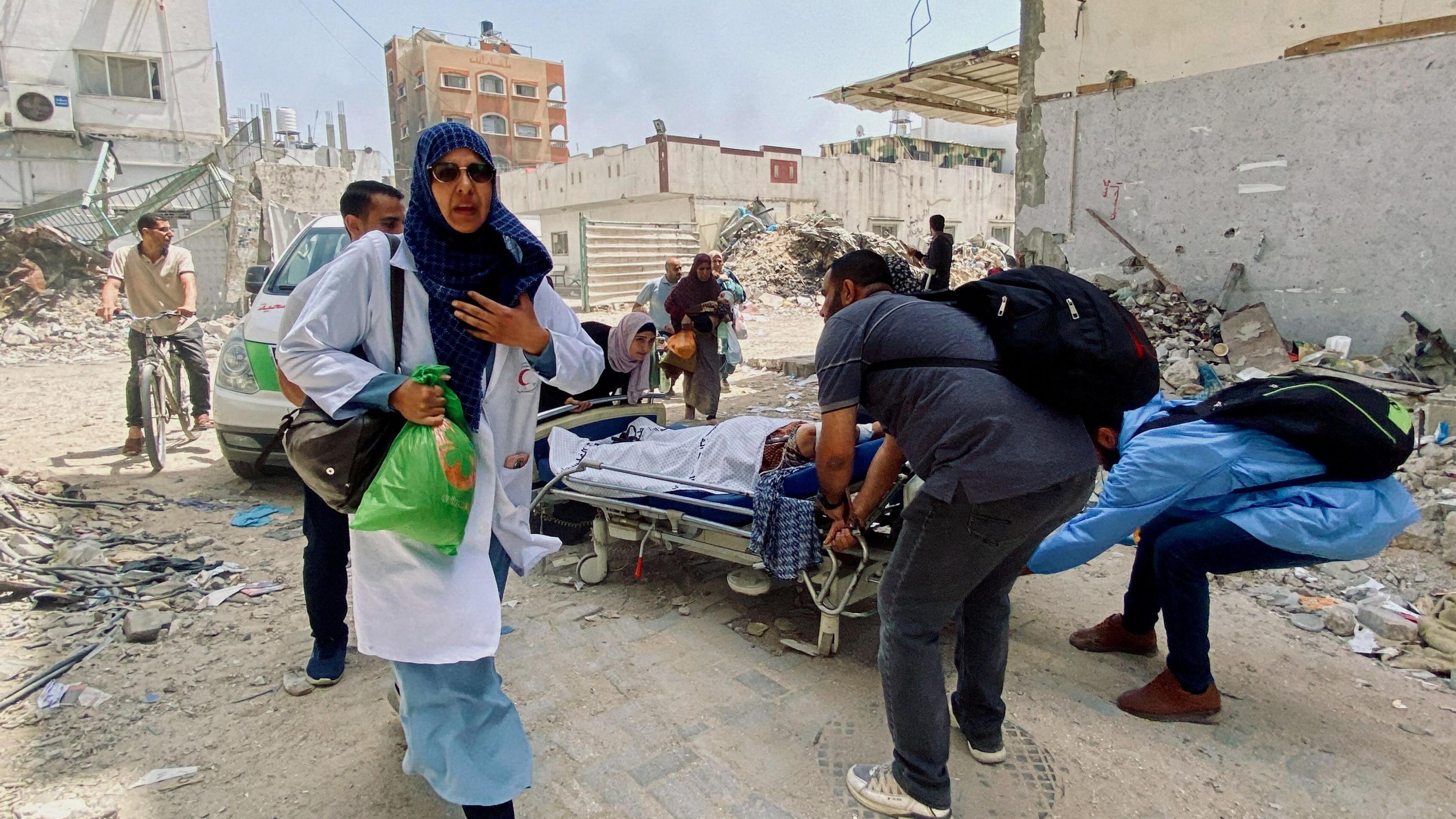
Medics at Kamal Adwan hospital in Beit Lahia said they had to evacuate patients after it was hit by an Israeli missile on Tuesday
Eid Sabeh, the nursing director at the nearby Kamal Adwan hospital, said his was the only medical facility open to patients in the north Gaza governorate.
But he warned: “The health situation at the hospital is catastrophic, especially with the imminent depletion of medical supplies and the fuel needed to operate the generators.”
Mahmoud al-Sharif, who lives in Jabalia’s refugee camp, said the IDF was targeting civilian homes and had besieged the al-Awda hospital.
“The situation on the ground is dire, with the army besieging several areas in Jabalia and its camp, and we hear nothing but gunfire,” he added.
The IDF wrote on X, formerly Twitter, that its forces were attempting to “eliminate terrorists, and locate and destroy underground infrastructure”.
